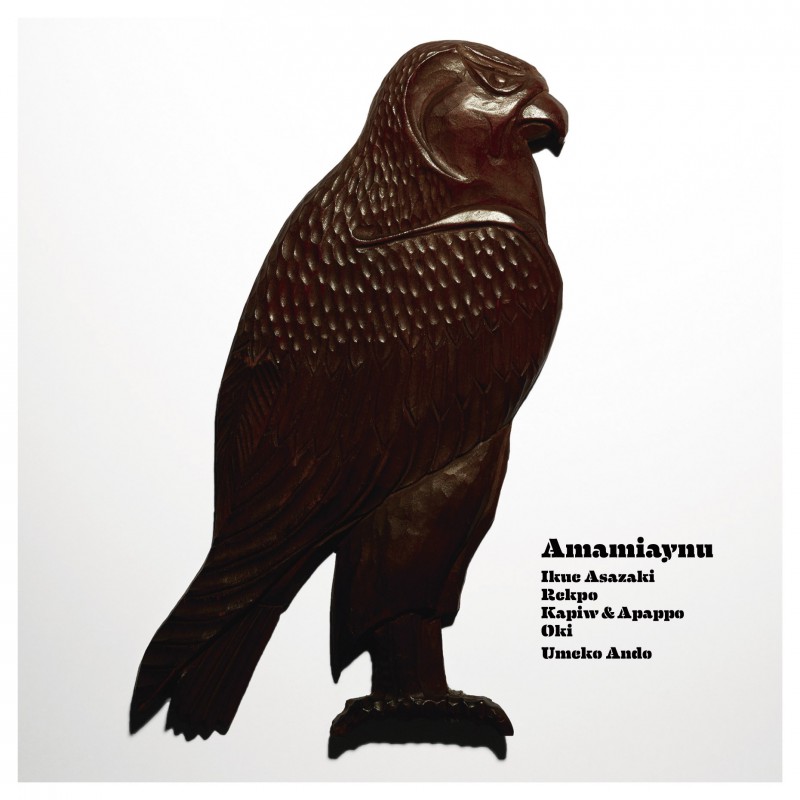News
AMAMIAYNU feauturing UMEKO ANDO , IKUE ASAZAKI ,KAPIW & APAPPO and REKPO
AMAMIAYNU
feauturing
Umeko Ando , Ikue Asazaki
Kapiw & Apappo
Rekpo , Oki
神様が来る時の唄はかったるい音なんだ
レコーディングの初日に私たちは朝崎さんの原風景を知ることになった。加計呂麻島、朝崎さんの実家のあった村には浜から山に向かって神様の通る道がある。浜側にはトネヤ*があって、よく人が集まって歌っていた。「いつものように私は外で遊んでいた。トネヤで唄が始まると、『ああ、今、神様が来てるんだ』と普通に思っていた。神様が来る時の唄はかったるい音なんだ。いつの間にか神様のやって来るところはトイレ付きの公民館に変わってしまった。」
「診療所を開業していた父は、診察の終わったおばあさんの前に録音機を置いて唄を録り始めた。父はその人が唄がうまいのを知っていたから。そして私はそのテープを何度も聴いて唄を覚えた。なかなか難しかった。」
「今の子たちは昔を忘れている」と朝崎さんは言う。都会的でポップなシマ唄に気持ちがついて行けないようだ。今の子たちからすると「あの時代の事はあの時代だからできた、今は今でやるべき表現がある」ということになるのだろう。
朝崎さんの話はまるでアイヌのフチ*から話を聞いているようだった。アイヌは厳しい時代を生き抜いた歴代のエカシ*とフチを敬い、「昔のまま」を好む傾向がある。だからアイヌ文化の現代化にはそれほど熱心ではない。なぜなら失ったものが多すぎて新しいものを作るための文化的な体力がまだまだ不足しているからだ。「昔の事を分かっていないのに新しいものが作れるか?」というのがアイヌのジレンマにもなっている。だから私は奄美や沖縄のように人気のでるポップな音楽を作れる環境は逆に素晴らしいと思うのだ。文化に携わるアイヌはほぼすべて「いくらがんばっても昔のエカシやフチにはかなわない」という認識を持っている。新しい事を生み出すより、失ったものを取り返しながら一歩ずつでも先祖に近づいて行くというのがアイヌが共有する大切なモットーになっている。
今回の共演の始まりは15年ほど前に遡る。アイヌの伝統的歌手、安東ウメ子さんと朝崎さんは奄美の海の見える小高い丘のステージに立った。お二人は同世代で朝崎さんはウメ子さんに会うやいなや彼女の手をとって、「奄美とアイヌの音楽が一つになる日が来た。」と熱く語りかけていた。「ウメ子さんの歌は奄美の歌に似ているなあと思った。一緒に歌い始めたら歌の兄弟のようになった。」と朝崎さんはあの日を振り返る。一方、ウメ子さんはいざ伴奏が始まると横にいたカピウに「あんた先に歌いなさい。」と耳打ちしている。何事もポジティブな朝崎さんと奄美マナーにびびる北海道組の対比がおもしろかった。歌以外の楽器が二人を邪魔してたのかもしれない。白波の立つ海を背に奄美の歌とアイヌの歌が強い風に乗ってうねっていた。
朝崎さんは前向きだった。ことあるごとにウメ子さんとの共演は奄美とアイヌの「歴史上初めてのセッション、世界一のセッション」だったことを人に伝えてきた。そして一緒に作品を作る約束を果たせないままウメ子さんが亡くなってしまった無念さをいつも忘れずにいた。
今回のセッションで「アイヌと奄美の音楽は一つになる」という朝崎さんの想いはようやく現実のものとなった。朝崎さんはアイヌのウポポ*を聞きながら、三味線が奄美に伝わる以前の曲ばかりを選んでいった。三味線がいなくなってお互い自由度が増し、昔の懐かしい風景が私たちの前にひろがった。
アイヌの歌い手、レクポは旭川出身で四人組のグループ、『Marewrew』のメンバー。カピウとアパッポは阿寒在住の姉妹で『Kapiw&Apappo』として活動している。三人とも江戸時代まで遡れるアイヌの子孫だ。
レコーディングの合間に解き明かされる曲の意味を話し合いながら、古いものをこよなく愛する奄美とアイヌの歌い手の気持ちはひとつになっていった。かったるい音にもなった。四人はちゃぶ台を囲んで録音した。いつしかウメ子さんのアルバムを録音した時と同じような風景が甦った。ウメ子さんの時は麦畑を走るトラクターが広い畑のむこうに行って音がしなくなったら録音開始だったが今回は静かに降る雪を見ながらの録音となった。一ヶ月半かけてミックスした音源は本日手元を離れる。「これはヒットするよ!」という朝崎さんの言葉が胸のなかでこだまする。
*トネヤ 神様への祈りをするところ
*フチ 祖母に対する尊敬語
*エカシ 祖父に対する尊敬語
*ウポポ 歌
”The songs when God shows up always sound languid”
Scenes of Recording Amami Ainu
On the first day of recording, we saw the indelible scene of Mrs. Asazaki’s childhood.
On Kakeroma Island, there’s a path that god takes, which stretches from Mrs. Asazaki’s hometown beach to the mountains.
On the beach, there is a toneya* where people used to gather to sing. “I would always be playing outside,” she said. “When the singing began at the toneya, I’d simply think, ‘ah, god is here right now.’ The songs when god shows up always sound languid. Before I knew it, the meeting spot that god came to turned into a community center with a toilet.”
“Once, my father who ran a clinic set a tape recorder in front of one of his patients, an old lady he just examined, and began recording her song. My father knew she was a great singer. I listened to this tape over and over again to learn the song. It was quite difficult.”
”Kids today have forgotten the past,” she says. It seems she can’t get interested in the urban and pop shima-uta of today. Though, kids nowadays might say, “what was made in the past was specific to the period, so we have to create our own forms of expression specific to the present.”
Hearing Mrs. Asazaki’s stories was like listening to the stories of Ainu huchi*. Ainu tend to respect the ekashi* and huchi of the past, preferring things “as they were.” Very few people are passionate about modernizing Ainu culture. This is because Ainu have lost so much, we haven’t built up enough cultural stamina to make anything new. “How can we make anything new when we don’t even know our past,” goes the Ainu dilemma. That’s why I think the environment in which the people of Amami or Okinawa can create popular pop music is wonderful. Most Ainu who are involved in Ainu culture think, “no matter how hard we try, we can’t compete with the ekashi and huchi of the past.” The motto shared by Ainu today is to slowly recover the past one step at a time, getting closer to the ancestors instead of making anything new.
The inception of this collaboration goes back about 15 years. Umeko Ando, a traditional Ainu singer, and Mrs. Asazaki stood on a stage atop a small hill overlooking the oceans of Amami. The two are of the same generation, and as soon as Mrs. Asazaki met Umeko, she took her hand and said with passion, “the day has come when Amami and Ainu music will be one.”
“I thought Umeko’s songs were similar to the songs of Amami. When we sang together, we were like sisters through our song,” Mrs. Asazaki recounts. Meanwhile, as the musical accompaniment began, Umeko whispered to Kapiw, saying, ”you sing first.” The contrast between the relentlessly positive Mrs. Asazaki and team Hokkaido, hesitant in the face of the Amami attitude, was amusing. Maybe the instrumentations were getting in the way of the two. The songs of Amami and Ainu rode the strong winds and billowed against the backdrop of the white-capped waves.
Mrs. Asazaki was enthusiastic. Every chance she got, she would tell people about her collaboration with Umeko; the partnership between Amami and Ainu, bragging, “[its] a historical session; the best session in the world.” Unable to fulfill her promise to record an album with Umeko, Mrs. Asazaki could never shake her regret.
This session realized Mrs. Asazaki’s desire to bring “Ainu and Amami music together.” Upon listening to the Ainu upopo*, Mrs. Asazaki only chose songs from a period before the arrival of the shamisen to Amami. Without the shamisen, both sides had more freedom. A nostalgic scene spread before our eyes.
Rekpo, an Ainu singer from Asahikawa, is one of the four members of Marewrew. Kapiw and Apappo are sisters from Akan who perform as Kapiw & Apappo. All three of them are descendants of Ainu. Their lineage is traceable back to the Edo period.
Between the recordings, we would talk about the meanings of these songs which revealed themselves to us, and slowly the minds of the Amami and Ainu singers who cherish the past became one. The sounds were languid, too.
The four of them recorded around a low table. Eventually, I recalled the scenery of recording Umeko’s album. With Umeko, we waited for the tractors to drive away through the wheat fields and for the sounds to disappear before beginning to record. This time, we recorded as we watched the quietly falling snow. I sent off the tape which I spent a month and a half mixing. “This will be a hit!” said Mrs. Asazaki. Her words still echo in my heart.
*Toneya – A place of prayer.
*Huchi – Honorific word for grandmother.
*Ekashi – Honorific word for grandfather.
*Upopo – Song
